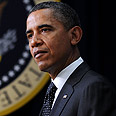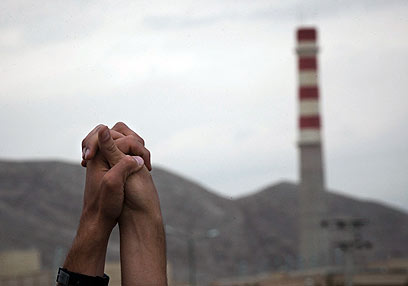
'US unsure what might prompt Israel to attack'
Obama administration does not know Jerusalem's intentions on potential military action against Iran; uncertainty stoking concern in Washington
The Obama administration does not know Israel's intentions regarding potential military action against Iran, and the uncertainty is stoking concern in Washington, where the preferred course for now is sanctions and diplomatic pressure.
Although Israel remains one of the United States' closest allies and the two countries' officials are in regular contact, US officials have a "sense of opacity" regarding what might prompt an Israeli military strike on Iranian nuclear sites, and about when such an attack might occur, according to a senior US national security official.
Related stories:
- Romney blasts Obama on Israel, Iran
- 'White House pushes to weaken Iran sanctions' 'Iran strike to create new market reality'
Two key US senators acknowledged on Tuesday that there are gaps in US knowledge about Israeli leaders' thinking and intentions.

Protest outside of nuclear facility in Isfahan (Reuters)
"I don't think the administration knows what Israel is going to do. I'm not sure Israel knows what Israel is going to do ... That's why they want to keep the other guys guessing. Keep the bad guys guessing," said Democratic Senator Carl Levin, chairman of the Senate Armed Services Committee.
Senator John McCain, the senior Republican on the committee, echoed Levin's view: "I'm sure (administration officials) don't know what the Israelis are going to do. They didn't know when the Israelis hit the reactor in Syria. But the Israelis usually know what we're going to do."
'Unintended consequences'
The uncertainty comes amid extraordinarily sharp public warnings in the last few weeks by US Defense Secretary Leon Panetta about the potential "unintended consequences" of military action against Iran.
Panetta told a forum in Washington last week that an attack on Iran would risk "an escalation" that could "consume the Middle East in confrontation and conflict that we would regret."
It could disrupt the fragile economies of the United States and Europe, spark a popular backlash in Iran bolstering its rulers and put US forces in the region in the firing line, he said. "The United States would obviously be blamed and we could possibly be the target of retaliation from Iran, striking our ships, striking our military bases," Panetta said.
General Martin Dempsey, chairman of the US military's Joint Chiefs of Staff, told Reuters in an interview he did not know whether the Jewish state would give the United States notice ahead of time if it decided to act.
An Israeli government official said, "Israel and the United States are in close and continuous communication on the threat posed to world security by the Iranian nuclear program. We appreciate President Obama's determination to prevent Iran from developing a nuclear weapon." The official declined to comment further.
At the same time, however, Obama's relations with Israeli leaders have not been particularly warm. He has not visited the country as president.
former US government official said: "There are plenty of instances when the Israelis have undertaken action without informing the United States first. So not always should we assume a level of coordination (between Washington and Israel) in advance on all issues."
- Receive Ynetnews updates directly to your desktop










